General requirements for international travelers
After just less than 2 years of being closed to inbound tourism, Vietnam reopened its borders for inbound tourism starting 15 March, 2022. Although there are still some details to be sorted out such as what ‘new normal’ visa policies will look like and what hotel transport options will be available, this is certainly a positive development that we expect will gain momentum in the weeks ahead.
Below is a summary of the details as they are currently. We will continue updating this page as details come in, and please do feel free to reach out to us with any questions at [email protected]

What are Vietnam’s travel restrictions now?
Most of the travel restrictions in Vietnam are lifted since March 16th, 2022. Here are 2 main points that you need to follow:
- Negative Covid test result before or after arriving in Vietnam
- Medical insurance covering COVID-19 treatment worth at least US $10,000, which costs around $30 USD.
Here is the latest update on Vietnam travel restrictions
What are the vaccination requirements?
All tourists aged from 12 and above are required to furnish a certificate stating they have been fully vaccinated or recovered from Covid and show a negative test result before or after arriving in Vietnam.
Those showing Covid symptoms would have to undergo rapid Covid testing when they land at the airport.
International visitors to Vietnam need to have medical insurance cover for Covid treatment.
Here is more detail about Vietnam Covid-19 vaccination guide
What is open in Vietnam at the moment?
After most of the restrictions are lifted, that makes the country an easiest country to visit in Southeast Asia, most of the services and businesses are now allowed to open as normal and preparing all the neededs to welcome visitors. Here is the latest update on Vietnam travel restrictions
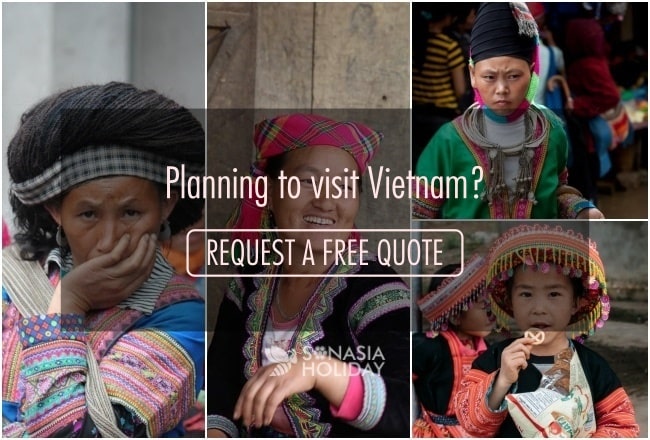
Vietnam attracts tourism from all around the world
Dating back to 2000 BC, Vietnam has one of the most ancient cultures in Southeast Asia. Since then, it’s been influenced by the Chinese as well as Khmer, Indians and of course the French, who colonized the country.
One area in which the French influence can still be seen is the country’s coffee culture. This makes it unique in a region more known for tea.
The cuisine is also unique and delicious. From refreshing soups to French inspired sandwiches and exquisite tropical fruits.
There are also beautiful beaches, magnificent mountains, and budget accommodations. The people are generally friendly. One way to experience the local culture is to shop in the roadside markets. Here visitors will not only find delicious food, but they will also be able to shop for local crafts.
Guided tours can take visitors through a variety of natural wonders. In the north, there are many lakes and limestone caves.
In Central Vietnam, visitors enjoy touring the red and white sand dunes. In the southern part of the country, the Mekong Delta provides a look at an ancient lifestyle with its houseboats and river people. It is also rich in biodiversity – 10,000 new species have been found here.
Vietnam is an interesting and beautiful country in Southeast Asia. While it is currently undergoing another resurgence of the coronavirus, given how quickly the government got things under control, there is hope that the country will be able to open for tourists soon.
When it does, it would be a great place to visit with its stunning natural beauty, ancient culture and delicious food and coffee.

FAQs for Vietnam Reopening
Here are some frequently asked questions that we received from travelers all around the world. Check it out if it is your case sometimes.
Planning Your Visit
Q: What are the countries and territories from where travelers may enter Vietnam?
As the latest release today (March 15th, 2022), Vietnam is resuming its visa policies the same as before Covid-19 pandemic. Hence, the travelers from around the world can travel to Vietnam as long as they are fully vaccinated with their last dose at least 14 days and no more than 1 year prior to their travel date, or have a certificate of COVID recovery no more than 6 months prior to their travel date. Moreover, travelers must take PCR test within 72 hours before entry or, for rapid antigen test, within 24 hours (except children under 2 years).
Entry Schemes
Q: What are the entry options for international travelers planning a trip to Vietnam?
From March 15th, 2023, international travelers can visit Vietnam as long as they are fully vaccinated and follow some simple requirements to enter Vietnam.
Visa Requirements
Q: What are the visa requirements, if any is required?
The visa policy has been resumes to be the same as before pandemic. Check more about Vietnam visa here
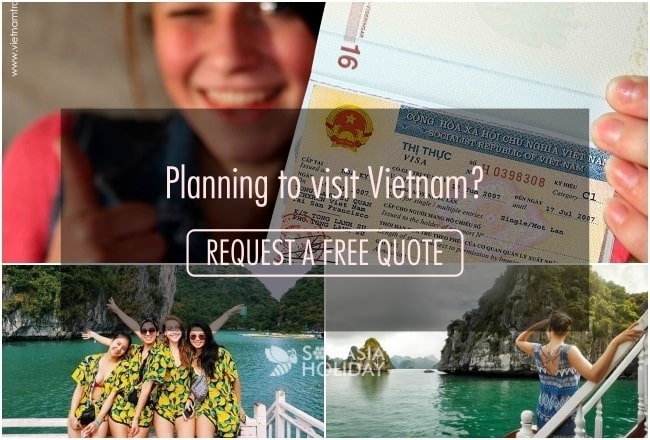
Vaccination Requirements
Q: What are the vaccination requirements?
Vietnam currently approves 8 COVID-19 vaccines, and everyone 12 years of age and older should get fully vaccinated for COVID-19 before travelling to the contry, while rules differ for those under 12 years. More details on COVID-19 vaccine guide for travelers to Vietnam.
Exit / Entry Screening
Q: What is the documentation requirement for exit screening at the point of departure?
All tourists aged from 12 and above are required to furnish a certificate stating they have been fully vaccinated or recovered from Covid and show a negative rapid antigen test result obtained within 24 hours at their accommodation facilities after arrival.
Travelers under 12 years of age, traveling with their parents or guardians, must have a negative test result (PCR test within 72 hours before entry or, for rapid antigen test, within 24 hours)
Q: What is the procedure after disembarking from my flight?
Upon arrival, you will show all the documents including proof of your vaccine status and negative Covid-19 test result before boarding the flight to Vietnam to immigration officers while checking in. No other special requirement needed.
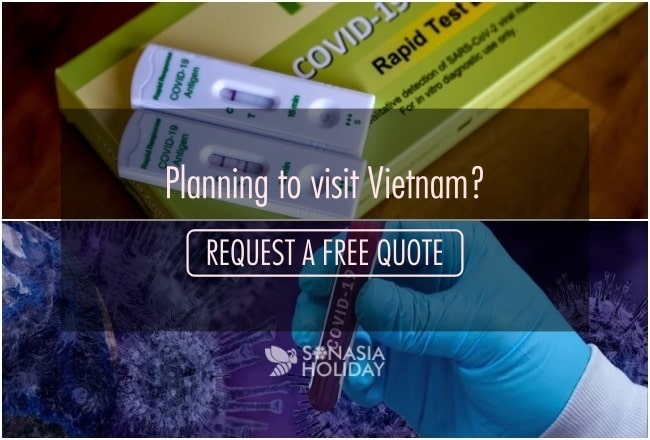
COVID-19 Testing Results
Q: What is the procedure in the event your COVID-19 test result returns as NEGATIVE?
If testing negative for COVID-19, travelers are free to go anywhere in Vietnam.
Q: What is the procedure in the event your COVID-19 test result returns as POSITIVE?
If testing positive for COVID-19, travelers will be referred for appropriate medical treatment:
- Pending on their conditions, they may be medically advised by to receive treatment in either hospital hotel isolation or community isolation.
- During receiving the medical treatment – at least 10 days, they must remain in their accommodation only. They should not leave their accommodation unless utmost necessary and must notify the Communicable Disease Control officer in-charge.
- After having recovered from COVID-19, they will receive a medical certificate of recovery.
Kindly note that the expenses must be covered by the required insurance for foreign travelers, or national healthcare coverage for Vietnamese and eligible foreign expatriates.
Sonasia Holiday recommends that travelers make sure to check the small print of any COVID-19 insurance policy before purchasing. Ultimately, the policy should cover the cost of treatment and other medical expenses associated with being infected with COVID-19, including in-patient hospitalization, hospital isolation, hotel isolation, or related quarantine.
The insurance policy should also cover the whole duration that travelers are planning to stay in Vietnam, plus at least 10 extra days as a precautionary measure in the event that the traveler’s second swab test result returns as positive.
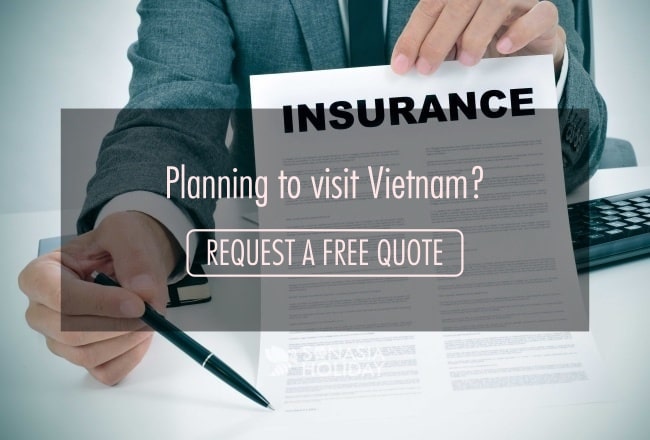
During Your Stay
Q: What are the health and safety precautions for travelers in Vietnam?
Protect yourself and others from COVID-19.
While in Vietnam, travelers are advised to strictly follow standard, good personal hygiene practices, such as, wear a mask in public, maintain hand hygiene (washing with soap and water or using hand sanitizer), and keep physical distance of at least 1 metre from others.
Travelers who are experiencing COVID-like symptoms should get tested. If testing positive they must get an appropriate medical treatment. Those with COVID-19 testing appointment must get tested.
Tourist safety
The Vietnam’s Government places the highest priority on the safety and well-being of every visitor to Vietnam. As the main government agency responsible for the promotion and marketing of Vietnam as a preferred destination, the Tourism Authority of Vietnam is working closely with all the concerned public and private organizations to ensure the utmost efforts to prevent any unfortunate incidents occurring on tourists and the local Vietnamese people.
COVID-19 Testing Requirements
Q: What is the COVID-19 test requirement while in Vietnam?
There is no further test required while in Vietnam except in case you have specific symptoms.
Travelers who book a tour package via a travel agency have responsibilities to report any abnormal symptoms to the guides, drivers, and tour agency that they book the tour with.
The independent travelers need to check with the certified test centers throughout the country in case of any abnormal symptoms.
Here is the full list.
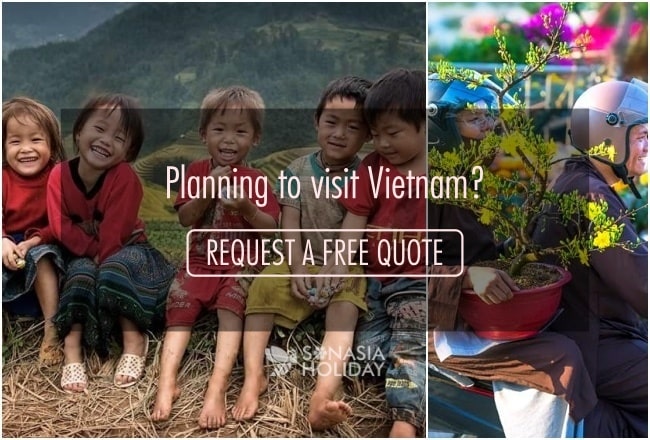
High-Risk Contact (HRC)
Definitions of close contact of probable/confirmed case of COVID-19.
Close contact is defined as a person who has had interactions with a confirmed or probable case of COVID-19 both on the illness onset or 1-2 days prior. However, for asymptomatic patients; a day of receiving positive test result is counted, and they have to reach these criteria as follow:
- Close contact or a person having conversation with the patient within 2-metre distance for more than 5 minutes; or being coughed or sneezed on by a patient.
- Those who are in an enclosed space without proper ventilation, e.g. in the same air-conditioned bus or room as the patient, for more than 30 minutes.
Close Contact Person or probable/confirmed cases can be divided into two groups
- High-risk contact is defined as a close contact as mentioned above and did not wear personal protective equipment (PPE).
- Low-risk contact is defined as a close contact who is less likely to contract or transmit the virus with the patient. This includes close contacts who have not met the definition for high-risk close contact. They are suggested to undergo self-monitoring and follow universal prevention. If experience respiratory symptoms, must undergo ATK . *In the event of asymptomatic infection, the date the patient has tested positive for the virus should be considered the date of illness onset.
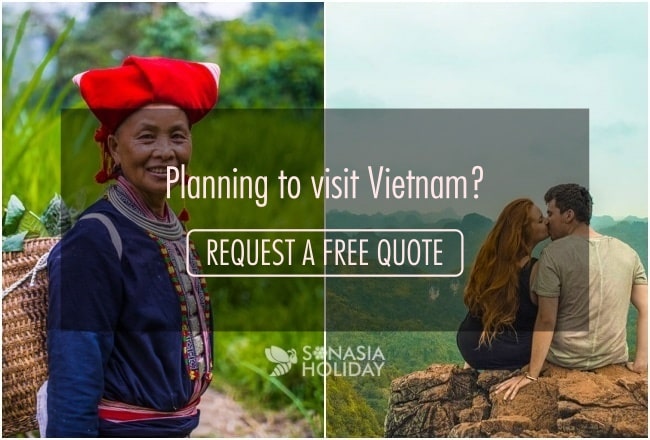
Definitions of travel-related High-Risk Contact (HRC) person.
- Domestic transportation
- Passengers on board the same vehicle/flight who is being coughed or sneezed on by a probable/confirmed case.
- Passengers who travel in the same group.
- Passenger on the same plane, who is close proximity to and sitting next to the case (left and right seats), or being close contact within 1 metre-without a mask more than 5 minutes.
- In case of large vehicles such as train, doubledecker bus, and ferry, only passengers in the same car or deck and do not wearing a face mask for more than 5 minutes.
- All drivers and attendants in the same section who do not wear face mask for more than 5 minutes. In case of flight attendants, just only who is on duty at the same section.
- International transportation
- Passengers on board the same flight who sit next to probable/confirmed case (left and right) or one who is being close contact within 1 metre-without a mask more than 5 minutes.
- Flight attendants in the same section who do not wear face mask for more than 5 minutes.
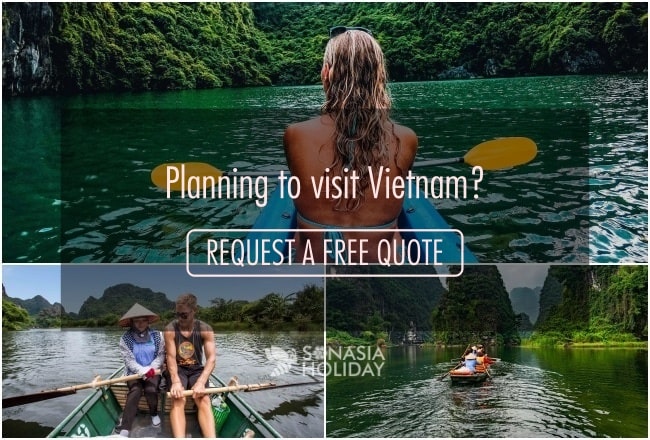
Guidelines and measures for High-Risk Contact (HRC) person
- Undergo home quarantine for 7 days and self-monitoring for 3 days. In addition, ATK will be done 2 times; Day 5-6 and Day 10.
- Take temperature check for 10 days after the day of last contact with the confirmed case.
- Protect themselves and people around them by separating themselves from others, frequently washing hands and wearing face mask.
- After completion of 7 days home quarantine, they are asked to follow strictly the Universal prevention and avoid going to crowded places or communities for 3 days.
- If HRC experience respiratory symptoms, must undergo ATK immediately, if having positive result, must redo on a couple of days and contact official.
Domestic Departure
Q: What is the requirement for domestic travel?
There is no specific requirement for domestic travel. Every province is required to apply the same condition as the guidelines from the government.
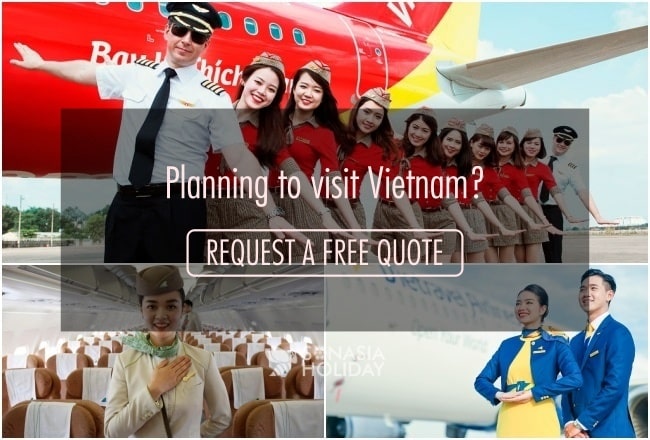
International Departure
Q: What is the requirement of the country/territory I will fly to after my stay in Vietnam?
For travelling from Vietnam to other countries, travelers are advised to follow the guidelines and measures announced by the respective country of their destination.
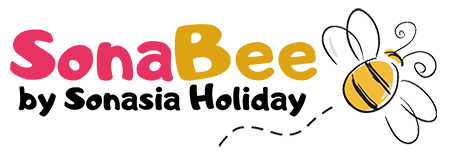

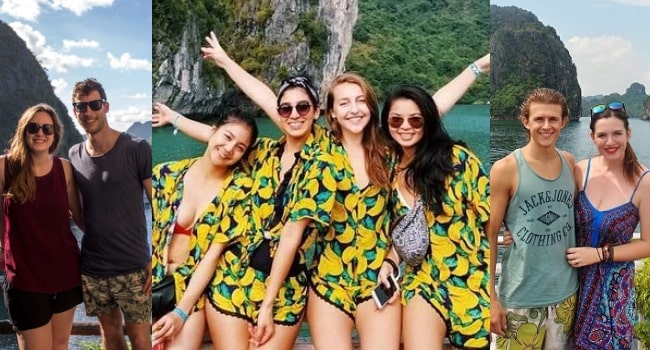

 25/02/2026
25/02/2026
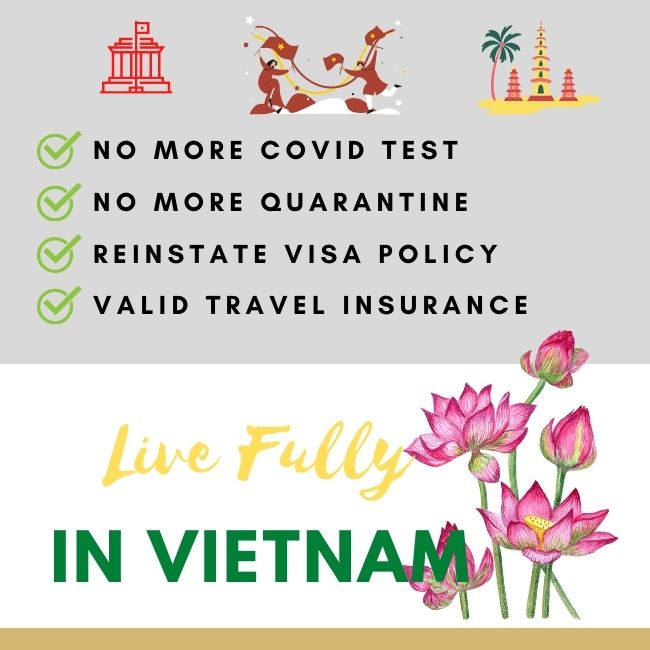




























Jolie LIEMMy name is Jolie, I am a Vietnamese girl growing up in the countryside of Hai Duong, northern Vietnam. Since a little girl, I was always dreaming of exploring the far-away lands, the unseen beauty spots of the world. My dream has been growing bigger and bigger day after day, and I do not miss a chance to make it real. After graduating from the univesity of language in Hanoi, I started the exploration with a travel agency and learning more about travel, especially responsible travel. I love experiencing the different cultures of the different lands and sharing my dream with the whole world. Hope that you love it too!